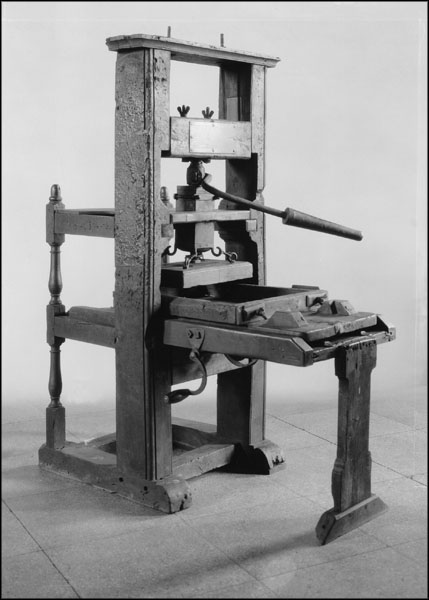When I was 8 years old, my mom took my siblings and I on a trip around the border of the united states. We stopped in a lot of states and saw a lot of interesting things. I remember visiting a print shop that produced newspapers and being in awe of the huge machinery. Later, when I was in fourth grade, I had the opportunity to stay the night at Sutter's Mill for a field trip. One of the activities we were able to participate in while we were there was assembling our own newspaper. Well, only partially. I was able to assemble the type for my own name for trip, "Clara Greenly" and pick one out of a list of predetermined headlines to have my name inserted into. Probably the most informative part of the experience was watching how the machinery was operated and the ink applied. I still have that newspaper in a drawer somewhere back home.
Newspapers didn't really circulate before the printing press. Handwritten news sheets made there way around Venice weekly in the 16th century. They contained information on politics and wars of Europe.
 |
| A German Newspaper |
The oldest printed newspaper's on record both began being published weekly in 1605 in German. The printers, Johann Carolus and Lucas Schulte, did not name the exact city were they printed the papers because they feared government prosecution. By 1610, there was a newspaper in Basel, in 1614 newspapers appeared in Venice and Frankfort, in 1616 newspapers started in Hamburg, Berlin in 1617 and Amsterdam in 1618. Although England did not develop her own newspaper until 1621 and France was without her own newspaper until 1831, but both countries had newspapers printed in their own languages circulating within them by 1620. Printers in Amsterdam reaped the rewards of the rewards of printing papers for larger audiences by printing in English and French as well as their Native language Dutch.
After these newspapers came out, it became the responsibility of the printer to find stories to fill up the pages. People began to expect that news be reported to them every week through the papers and publishers saw that they needed to consistently have stories every week to stay in business. This is probably one of the first times that expectations of receiving knowledge occurred among the general populace. As a result of a competitive market, printers had to stay on a strict schedule of receiving and printing stories. Reporting, editing and publishing became occupations associated with newspapers.
These newspapers started by simply printing the facts. For example, a city was under attack on this day and fell this day. the journalists new what was going on, but this style of reporting left the reader confused and wanting to hear the story. Over time newspapers began to report in more narrative styles to appease the readers.
These first newspapers did not have freedom of the press, and so avoided reporting on occurrences within their own country. If they printed something contradictory to government ideology, they would be shut down. As a result of unstable government, English printers were able to gain greater press freedom around 1644 at the time Milton wrote Areopagitica. The printers lost freedom as the government stabilized, but regained freedom as a result of the Glorious Revolution 1688 and eventually the idea that it was good for the press to be able to criticize government took root in England. Other countries took longer to come to this conclusion and continued to be censored
And now standard newspapers are going out of business as a result of digital communication. What a short history.






Favorite part: "This is probably one of the first times that expectations of receiving knowledge occurred among the general populace." Nice. It's interesting that we still expect knowledge from newspapers. We can sill access a lot of this knowledge for free, but I'm kinda glad that newspapers are beginning to offer a premium way to enjoy the news. (Not that I *want* to pay, just that I think they deserve it. :)
ReplyDeleteLast line: so depressing. But hey, we're saving trees! :P
Will the newspaper stay in print edition for another 50 years? I believe that the change to a more digital format will spur more interest in it, but there's always a novelty in the old medium, like vinyl records, jukeboxes, and bell-bottoms but the most user friendly, popular and/or efficient one usually sweeps the floor it seems...
ReplyDeleteI think it's the content of the newspaper more than the newspaper itself that is important. Sharing current events- providing info to the common man- that's the revolution that started with newspapers. And even if they now are maintained through a digital format, that sharing of information is not going to stop; so the legacy of newspapers will live on. But like Blaine said, there will always be people that appreciate the old medium that will actively seek it out. So while they may become less popular, I don't think printed newspapers will cease to exist.
ReplyDelete